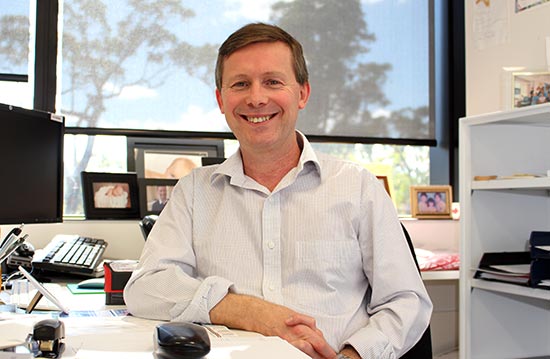
A new therapy developed by respiratory researchers from the Hunter Medical Research Institute (HMRI) and UK has yielded a marked reduction in acute asthma exacerbations triggered by the common cold.

A new therapy developed by respiratory researchers from the Hunter Medical Research Institute (HMRI) and UK has yielded a marked reduction in acute asthma exacerbations triggered by the common cold.
The international Phase 2 trial of a synthetic anti-viral ‘interferon’, inhaled via a nebuliser, proved most effective in helping patients with more difficult asthma when they developed a virus- or cold-induced attack.
Interferons are proteins that effectively ‘interfere’ with a virus’s ability to interact with host cells and then spread. They also occur naturally as part of the body’s immune response.
“We’re not interested in curing the common cold – or rhinovirus as it’s known – we want to limit the negative effect it has on asthma,” Conjoint Professor Peter Wark, co-director of the University of Newcastle’s Priority Research Centre for Asthma and Respiratory Diseases, said.
“Around 80 per cent of acute exacerbations are triggered by respiratory tract infections and our existing treatments are, at best, only partially effective.”
During the trial, patients were asked to send an SMS text at the onset of cold-like symptoms and they were then assessed within 24 hours and administered either the interferon or a placebo.
The results, published in the American Journal of Respiratory and Critical Care Medicine, have encouraged the researchers to further explore the susceptibility and response factors.
“We didn’t see a large benefit in everyone with asthma, especially those with already mild asthma,” Professor Wark said. “But in those whose asthma was more severe and difficult to control, the response was far better – we saw a significant reduction in their asthma exacerbation.
“The question is where we go from here. People who are most at risk of virus-related acute asthma are not well defined and we think more work needs to be done.”
A follow-up trial, starting shortly, will aim to determine which patients respond better to the therapy while also looking for biomarker signatures.
Professor Wark believes nebulised interferon could be applied to other patients with chronic respiratory diseases that suffer from recurring viral infections, including cystic fibrosis and COPD (Chronic Obstructive Pulmonary Disorder).
The Phase II trial was conducted in Newcastle, Sydney, Melbourne and eight sites in the United Kingdom, in association with the University of Southampton and Imperial College London. Professor Wark is a senior staff specialist at Hunter New England Health and a member of HMRI’s VIVA Program. HMRI is a partnership between the University of Newcastle, Hunter New England Health and the community.
HMRI would like to acknowledge the Traditional Custodians of the land on which we work and live, the Awabakal and Worimi peoples, and pay our respects to Elders past and present. We recognise and respect their cultural heritage and beliefs and their continued connection to their land.
Hunter Medical Research Institute
We’re taking healthy further.
Locked Bag 1000
New Lambton
NSW, Australia, 2305


This site is protected by reCAPTCHA and the Google Privacy Policy and Terms of Service apply.
Copyright © 2024 Hunter Medical Research Institute | ABN: 27 081 436 919
Site by Marlin Communications
